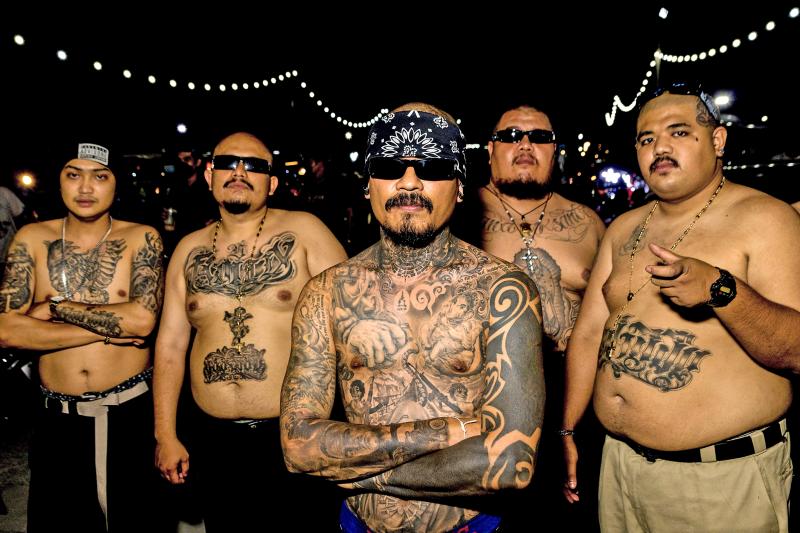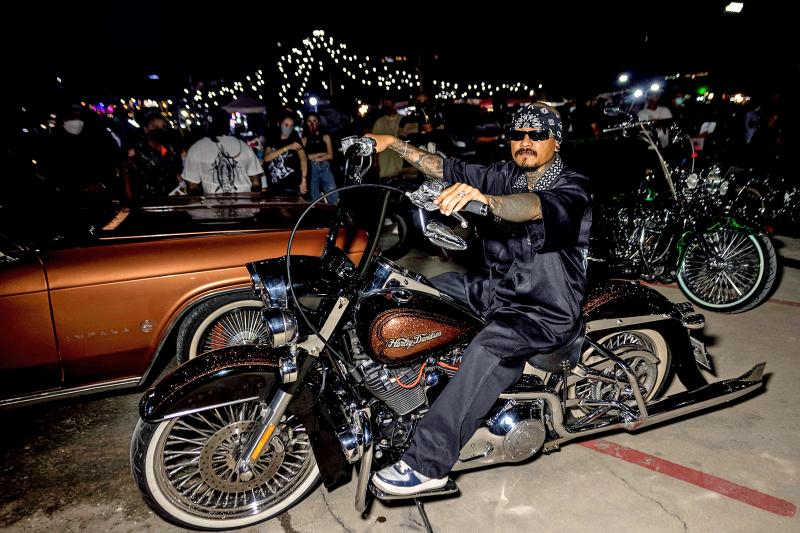The crowd roars in the tightly packed room as the broad-shouldered, tattooed men stop pummeling a young recruit and smother him with hugs — completing his initiation into one of Thailand’s “Chicano” gangs.
For the tight-knit group of friends, the ritual embodies a concept of a Mexican-American Chicano culture increasingly embraced in Asia, with sounds, styles and swagger from the US finding a home first in Japan, and now Thailand.
Dressed in baggy T-shirts and jeans, with bandanas and wraparound sunglasses only partially obscuring their intricate tattoos, Thais can now be seen on Bangkok’s sweaty streets celebrating a fusion of their own and Chicano culture each weekend.

Photo: AFP
But while the Chicano movement in the US began as a political and social force aimed at battling oppression, its Thai interpretation is focused more on its aesthetics.
“I just want to combine a Thai touch with the Chicano style to make this lifestyle simple and accessible,” explained gang leader Chalakorn “Leng” Arttanasiri, dismounting from his Harley Davidson.
Dragging on a smoke, the 40-year-old — who has images of the Virgin Mary, a Mayan goddess and much of “The Godfather” cast tattooed across his body — said his “Barbarian Has a Gun 13” group celebrates Chicano clothing and tattoos.

Photo: AFP
Its members say they are drawing on shared blue-collar values to create a blended “Thaino” culture, leaving their Chicano selves behind during the working week.
“On normal days, we dress like normal people,” Leng said, “but on the day of the gathering like this, we need to have options for our clothing so that we could look sharp and rock the same style as the others.”
A former drug-dealer, he grew up in a slum and served time but turned his life around running a business importing Chicano clothes, which prompted him to create a group to celebrate the culture.
But he has no time for the violence often associated with Chicanos by Hollywood — despite the tough initiation.
“It’s just a way to test their will,” he explained of the 13-second ordeal recruits endure to join his group.
“We can’t go around beating up other gangs to show our superiority,” he said. “We live in peace because we’re in a Buddhist-based city. We’re in Thailand.”
‘LAW-ABIDING CITIZENS’
“We’re law-abiding citizens who just love the Chicano subculture,” said Pongtep Singto, a lowrider car aficionado.
The 32-year-old was drawn to the scene’s low-slung, streamlined cars, collecting and customising the vehicles, and eventually building his own.
“Everybody has an honest career. Some of them may have tattoos all over their bodies but they’re all good people,” he added.
At a recent gathering, heavily tattooed men happily chatted as their children played in the background.
Among them was new recruit Chaiya Nob, who explained how gang “seniors” — only 13 of whom are permitted to have the group’s name dramatically emblazoned across their bellies — assessed him before he was allowed to join.
“Dressing like this doesn’t mean we have to act all macho, act like gangsters, and do illegal stuff,” the 31-year-old said.
“We have to do good and be respectable citizens. Our clothing choices may not be appropriate but our attitude is approachable,” he added with a grin.
Ultimately, the gang is about celebrating Chicano subculture together. As Leng puts it: “We’re family.”

On April 26, The Lancet published a letter from two doctors at Taichung-based China Medical University Hospital (CMUH) warning that “Taiwan’s Health Care System is on the Brink of Collapse.” The authors said that “Years of policy inaction and mismanagement of resources have led to the National Health Insurance system operating under unsustainable conditions.” The pushback was immediate. Errors in the paper were quickly identified and publicized, to discredit the authors (the hospital apologized). CNA reported that CMUH said the letter described Taiwan in 2021 as having 62 nurses per 10,000 people, when the correct number was 78 nurses per 10,000

As we live longer, our risk of cognitive impairment is increasing. How can we delay the onset of symptoms? Do we have to give up every indulgence or can small changes make a difference? We asked neurologists for tips on how to keep our brains healthy for life. TAKE CARE OF YOUR HEALTH “All of the sensible things that apply to bodily health apply to brain health,” says Suzanne O’Sullivan, a consultant in neurology at the National Hospital for Neurology and Neurosurgery in London, and the author of The Age of Diagnosis. “When you’re 20, you can get away with absolute

May 5 to May 11 What started out as friction between Taiwanese students at Taichung First High School and a Japanese head cook escalated dramatically over the first two weeks of May 1927. It began on April 30 when the cook’s wife knew that lotus starch used in that night’s dinner had rat feces in it, but failed to inform staff until the meal was already prepared. The students believed that her silence was intentional, and filed a complaint. The school’s Japanese administrators sided with the cook’s family, dismissing the students as troublemakers and clamping down on their freedoms — with

As Donald Trump’s executive order in March led to the shuttering of Voice of America (VOA) — the global broadcaster whose roots date back to the fight against Nazi propaganda — he quickly attracted support from figures not used to aligning themselves with any US administration. Trump had ordered the US Agency for Global Media, the federal agency that funds VOA and other groups promoting independent journalism overseas, to be “eliminated to the maximum extent consistent with applicable law.” The decision suddenly halted programming in 49 languages to more than 425 million people. In Moscow, Margarita Simonyan, the hardline editor-in-chief of the